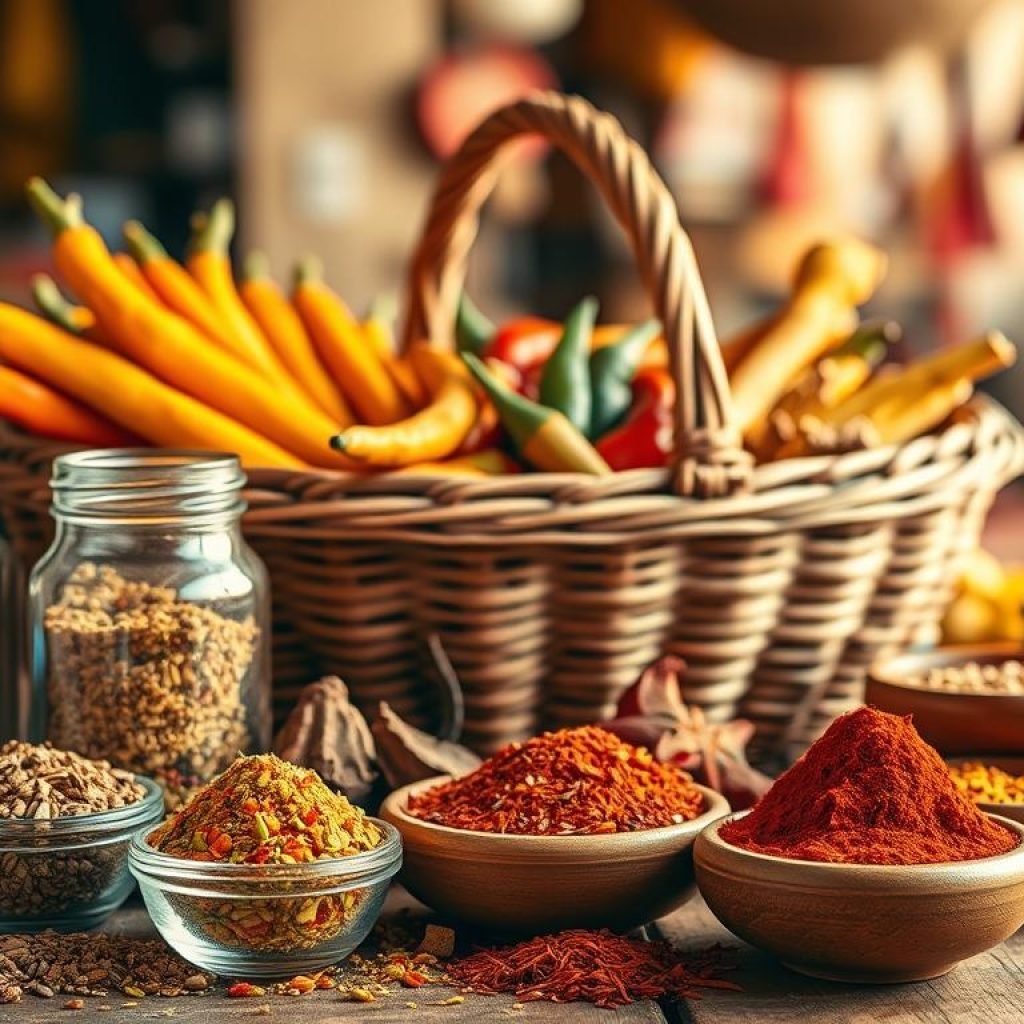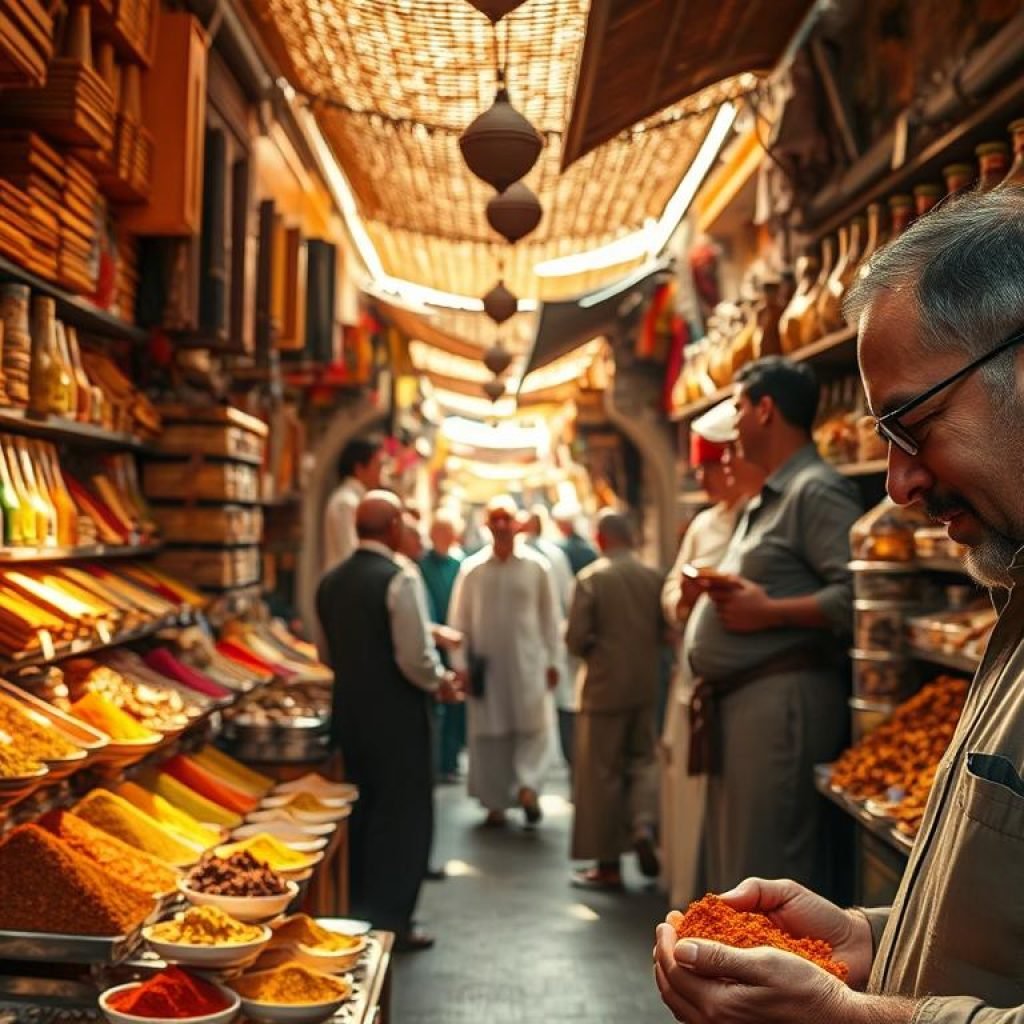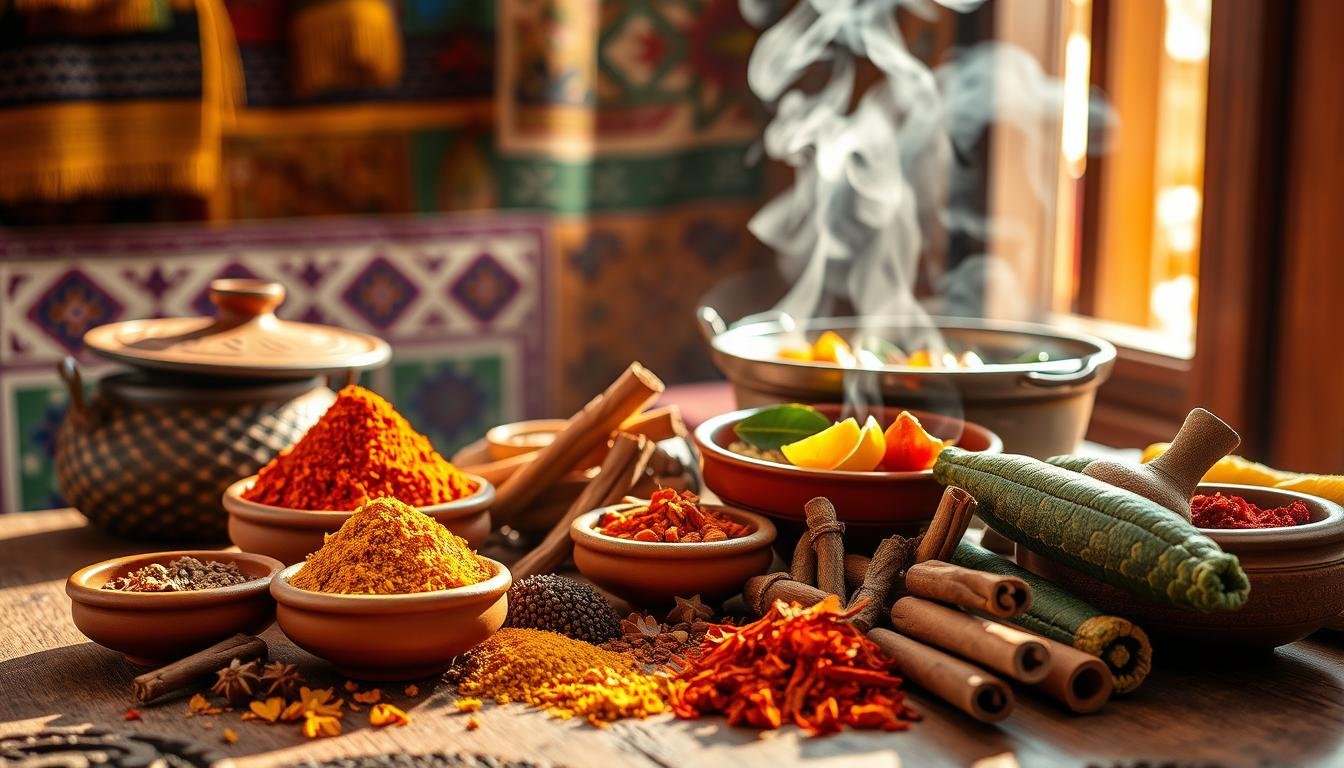Are you a vegetarian traveler heading to Morocco? Wondering what tasty dishes you can try? Morocco is full of vegetarian delights, thanks to its rich food culture and fresh ingredients. You can buy spices in Morocco to make your own dishes or find inspiration online. The locals are very welcoming, so asking for vegetarian meals is easy.
Introduction to Moroccan Cuisine
Moroccan food is famous for its strong flavors and smells, with cumin being a key spice. As a vegetarian, you’ll find lots of fresh veggies, fruits, and legumes. Whether you’re buying spices in Morocco or looking online, you’ll discover many ways to spice up your meals. Major cities have many restaurants with vegetarian options, so you’re sure to find something you like. Be sure to try local favorites like vegetable tagine and couscous.
Key Takeaways
- Morocco offers a wide range of vegetarian options, including tagines and couscous
- You can buy spices in Morocco or explore Moroccan spices online for inspiration
- Cumin is a main spice used in nearly all Moroccan dishes
- Fresh vegetables, fruits, and legumes are abundant in Morocco
- Many restaurants in major cities offer vegetarian sections or dishes
- Shopping for spices in Morocco can be a fun and rewarding experience
- Moroccan cuisine is known for its bold flavors and aromas, making it a great destination for vegetarian travelers
Introduction to Moroccan Spices
Moroccan cuisine is famous for its complex spice blends. These blends create unique and aromatic flavors. At a spice shop in Morocco, you can find many spices and blends, like ras el hanout and baharat.
These blends are key to Moroccan cooking. They add depth and warmth to any dish. It’s important to know the different spices used in Moroccan cuisine.
Common spices include cumin, coriander, cinnamon, and ginger. These are mixed in various ways to make distinct blends. Ras el hanout, for example, can have up to 27 spices. You can buy these blends at a local spice shop in Morocco.
Some popular spice blends to purchase include:
- Ras el hanout: a blend of up to 27 spices, including cumin, coriander, and cinnamon
- Baharat: a blend of spices, including cumin, coriander, and cinnamon, with a focus on warm, aromatic flavors
When shopping for spices, quality and authenticity matter. Choose spice shops that get their spices from local farmers. This ensures the best flavor and aroma. Buying spice blends from a reputable shop in Morocco can enhance your cooking and bring out the rich flavors of Moroccan cuisine.
Shopping for Spices in the Souks
Exploring Marrakech’s souks reveals a treasure trove of authentic Moroccan spices, including saffron. To find the best saffron, learning to navigate the markets and haggle is key. The souks are open daily, but hours change during festivals like Ramadan.
Walking through the alleys, you’ll see many vendors with spices, textiles, and crafts. For the best prices, visit early morning or late evening. Look for high-quality saffron to enhance your cooking.

For successful haggling, start with one-third of the seller’s price and be ready to leave if it’s not fair. With time, you’ll find great spices, like saffron, to enjoy at home. Shopping in the souks is a memorable adventure, whether you’re a seasoned traveler or new to Moroccan cuisine.
Exploring the Souks of Marrakech
Marrakech is famous for its lively marketplace, with about 3,000 stalls in its souks. To discover the top spice market Morocco, visitors should check out Souk Semmarine, Souk Nejjarine, and Souk El-K. Each souk has its own special products, making them perfect for finding unique souvenirs or gifts.
For those looking for where to buy spices in Marrakech, Souk Semmarine is a great spot. It offers a wide variety of items, like textiles, carpets, leather goods, spices, and handicrafts. The spice souk is famous for its top-notch herbs and spices, perfect for food lovers.
Visitors can begin their journey at Jemaa el-Fnaa Square, the heart of cultural and social life. From there, they can explore Souk Semmarine and other souks, all while bargaining for the best deals. The souks of Marrakech offer a rich history, lively atmosphere, and a unique shopping experience, making them a must-see for anyone visiting Morocco.
Tips for Buying Spices in Morocco
Buying spices in Morocco means looking at quality and authenticity, and the price. The old medina in Casablanca is a top spot to start. Moroccans use a lot of spices, like over 75,000 saffron flowers for just 1 pound.
For the best spices, find vendors who know their products well. Be wary of extremely low prices as they might mean low quality. Look for cumin, ginger, and cinnamon, key spices in Moroccan cooking.

- Research the market and know the average prices of the spices you’re looking for
- Inspect the spices for quality and freshness
- Don’t be afraid to haggle and negotiate prices
- Consider buying spices in bulk to save money
By following these tips, you can find the best spices in Casablanca. Then, you can enjoy Moroccan flavors at home.
Moroccan Spice Blends
Moroccan cuisine is famous for its rich spices. Moroccan spice blends are key to this. You can find them online or in Morocco’s spice shops. This lets anyone enjoy Moroccan flavors.
Online, you can buy Moroccan spice blends from many places. Visit online marketplaces or specialty food stores.
Popular blends include Ras el Hanout and Baharat. Each has its own spice mix. Ras el Hanout, meaning “top of the shop,” can have up to 60 spices. It’s complex and aromatic.
Ras el Hanout
Ras el Hanout is a must in Moroccan cooking. It has 12 key ingredients. You can make a quick version with ground spices, using 1 teaspoon of each.
This blend is great in dishes like couscous and pastilla.
Baharat
Baharat is also loved in Moroccan and Middle Eastern cooking. It’s made with spices like cumin, coriander, and cinnamon. It’s used to flavor meats, stews, and soups.
Want to try Moroccan flavors? Buying Moroccan spice blends online is easy. You can add Moroccan taste to your cooking with quality blends.
Cooking with Moroccan Spices
Cooking with Moroccan spices is an art that needs a deep understanding of spice blends. Moroccan cuisine is famous for its rich flavors. These come from spices like cumin, coriander, cinnamon, and turmeric. It’s key to use quality ingredients and traditional recipes to get the right flavors.
Ras el hanout is a well-known Moroccan spice blend. It has over 30 spices, including cinnamon, ginger, and cloves. This blend is great for adding flavor to tagines and stews. Baharat is another blend, with spices like cumin, coriander, and cinnamon. It’s often used for meats and vegetables.
Popular Moroccan recipes include chicken tagine with olives and preserved lemons. Also, vegetable couscous with spices and herbs. These dishes are tasty and easy to make. You can also try modern twists like Moroccan chicken salad or vegetable tagine.
Remember, using quality ingredients and traditional recipes is key. With practice, you can make delicious Moroccan dishes. Cooking with Moroccan spices adds excitement and flavor to your meals.
Health Benefits of Moroccan Spices
Moroccan spices have been used for centuries for their flavor and health benefits. Many Moroccan spices have anti-inflammatory properties. Turmeric, for example, is a key spice with strong anti-inflammatory effects, making it great for a healthy diet.
These spices offer many health benefits. They can reduce inflammation, improve digestion, and boost the immune system. Cumin, a common spice, helps with carpal tunnel syndrome, diarrhea, and indigestion. Ginger aids digestion, helps with constipation, and soothes colic in babies.
The use of spices in Moroccan cuisine is rooted in both culinary and medicinal traditions. Spices are used for their health benefits as well as flavor. A typical tagine marinade includes garlic, olive oil, cumin, paprika, turmeric, and saffron. These ingredients have various health benefits. Adding these spices to your diet can bring you the health benefits of Moroccan spices.
Some key spices with health benefits include:
- Turmeric, with its anti-inflammatory properties
- Ginger, which aids in digestion and reduces nausea
- Cumin, which can help lower blood sugar levels and improve digestion
- Cinnamon, which has properties that help with blood clotting and reducing cholesterol rates
Cultural Significance of Spices in Morocco
Spices have been crucial in Moroccan culture and history. Morocco was a key player in the spice trade. Its strategic location made it a major crossroads for trade, with spices being highly valued.
The spice culture in Morocco shows the country’s rich heritage. Moroccan cuisine is all about experimenting with spices. This reflects a cultural practice of adjusting flavors to find balance. Spices are a big part of Moroccan life, from souks to kitchens.
Important spices in Moroccan cuisine include cumin, coriander, and turmeric. These spices add flavor and have health benefits. Each spice has a unique role in Moroccan cooking, showing the cultural importance of spices.
The spice trade in Morocco has a long history. The country was a major hub for spices like saffron and cinnamon. Spices are used in cooking, medicine, and rituals, highlighting Morocco’s rich history and culture.
Conclusion
Shopping for spices in Morocco can be both exciting and challenging. With so many Moroccan spice blends to choose from, it’s key to know what to look for. The souks and local markets offer a wide range of options, but the quality can vary.
To get the best spices, choose vendors who sell in small amounts. Whole spices are better than ground ones. Also, keep your spices in good condition to preserve their flavor and smell. Ras el Hanout is a popular blend, made with cinnamon, turmeric, cumin, ginger, and cloves.
Here are some final tips for shopping for spices in Morocco:
- Research the different types of spices and blends before you go, so you know what to look for
- Don’t be afraid to haggle and negotiate prices
- Look for vendors who sell spices in small quantities and opt for whole spices over pre-ground ones
- Store your spices properly to maintain their flavor and aroma
By following these tips, you can find the best Moroccan spice blends. This will enhance your cooking and add a Moroccan touch to your dishes. Whether shopping in Morocco or online, being informed and patient is key. With practice, you’ll become a spice expert and make delicious Moroccan dishes.
Additional Resources
If you love the flavors of Moroccan cuisine, there’s more to explore. The Spice House and Moroccan Caravan are great places to buy authentic spices online. They have a wide range of high-quality spices to help you make Moroccan dishes at home.
There are also many blogs and websites about Moroccan cuisine and spices. They offer recipes, cooking tips, and insights into the cultural importance of spices. These resources can help you learn more about Moroccan culinary traditions.




Comment (0)